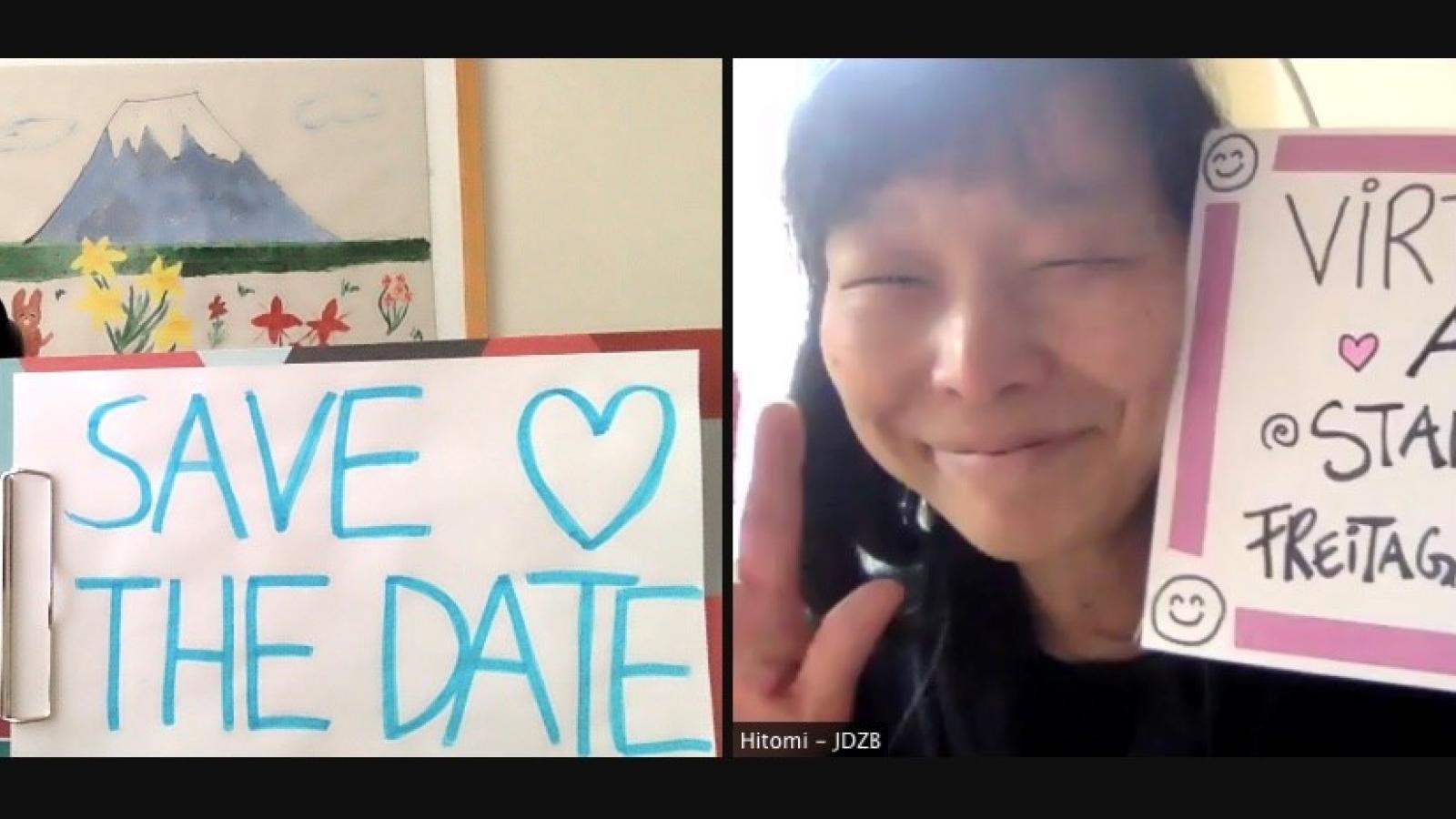
One of the most important goals of the JDZB is to inspire (future) decision-makers from Japan and Germany to become excited about the other country. What could be better suited for this than traveling to the other country, experiencing the culture with all your senses, conversations with peers as well as intergenerational encounters on location?
The JDZB offers various programs for young professionals and trainees, young volunteers and professionals from the child and youth welfare sector (funded by the Federal Child and Youth Plan and the Japanese Ministry of Education, Culture, Sports, Science and Technology). As part of the Junior Experts Exchange Program, young scientists from Japan and Germany learn more about each other’s research fields (funded by the Federal Ministry of Education and Research and the Japanese Foreign Ministry). In the privately funded German-Japanese Young Leaders Forum we support future leaders (current sponsors: Daido Life Insurance Company, Mori Manufacturing Research and Technology Foundation, Yamaoka Memorial Foundation, YANMAR HOLDINGS CO., LTD., Yuasa M&B Co., Ltd.). In addition, the ScienceYouth Program serves to initiate sustainable exchanges between Japanese and German high schools (sponsored by OLYMPUS Europa SE &Co. KG).
Paths to Germany - Paths to Japan
Initial and continuing encounters between young people from Japan and Germany are also facilitated and initiated at many other levels, for example, through governmentfunded exchange programs (e.g. the Japan Exchange and Teaching Program JET and the MIRAI program of the Japanese Ministry of Foreign Affairs, specialized programs organized by IJAB – Fachstelle für internationale Jugendarbeit der Bundesrepublik Deutschland, organized specialized programs), home stays abroad arranged by not-for-profit youth exchange organizations (such as AFS Interkulturelle Begegnungen e. V. or Deutsches Youth For Understanding Komitee e.V.), voluntary services (e.g. through ijgd), youth hostel exchanges and internship programs (such as DAAD’s “Language and Practice in Japan”, the “Vulcanus” program for young Europeans or individually organized internships, e.g. through KOPRA – International Internship Platform).
Intensive exchanges also take place in the fields of music, culture or sports (e.g. through the Bundesvereinigung Kulturelle Kinder- und Jugendbildung (BKJ) or the professional and simultaneous exchanges of the Deutsche Sportjugend). Encounters between young people from Japan and Germany also take place within the framework of numerous city, school and university partnerships and through the more than one hundred Japanese- German and German-Japanese societies.
Through the Foundation of the Federation of German-Japanese Societies, established in 2018, funds are explicitly available for youth exchange activities. In addition to the numerous regionally anchored projects, there is even a supra-regionally active German-Japanese Youth Association on the German side (DJJG) and, on the Japanese side, the Japanese-German Youth Network with its “Hello” program, among others.
The Studienwerk für Deutsch-Japanischen Kulturaustausch in North Rhine-Westphalia organizes an annual four-week scholarship program in cooperation with the Düsseldorf-Japan Study Fund. Now, in the current COVID pandemic, alumni have planned an online event “Experience Japan Digitally,” in which visions for “Urban Life 2.0” will be developed in various interactive breakout sessions.
The Embassy of Japan offers a good overview of exchange, research and education programs of non-commercial institutions as well as scholarships on its website; another source of information on the German side is the country page Japan of IJAB and “rausvonzuhaus” (let’s leave home) (by eurodesk) or the Japan fair “#Seitenwechsler – wir bringen dich nach Japan!” (Change sides – we’ll take you to Japan). The DJJG regularly presents various exchange organizations here.
International encounters in the digital space
Unfortunately, many of the usual programs could not take place last year and this year due to the pandemic. But how do you maintain international exchange when you can’t travel? There is certainly no substitute for international experience in person in the other country. On the positive side, however, the current state of technology has opened up good opportunities to overcome geographical distance in an uncomplicated way, at least digitally, through online video conferences and communication platforms and networks in social media.
Like many other organizations, we have therefore taken advantage of the situation to move international meetings into the virtual space and to maintain existing networks through low-threshold, continuous exchange. For example, our colleagues in the Youth Exchange department set up online regular catch-up sessions for alumni during the pandemic, and were surprised at how well it worked. Using digital exchange formats, we also succeeded in efficiently maintaining the professional collaboration of the German-Japanese Study Program for Child and Youth Welfare Professionals, which this year looks back on a fifty-year history.
The virtual “kick-off” for the 15th German-Japanese Young Leaders Forum was not intended as a replacement for the summer school originally planned for Berlin and Potsdam, but it was an interesting alternative and a good prelude to the originally planned program. The Alumni Association of the German-Japanese Young Leaders Forum is also creating new points of interaction with a new virtual event series. The talks will take place regularly about once a quarter and highlight relevant topics, initially around sustainability, from the perspective of Japan and Germany. The aim of the series is to create more exchanges for the association’s members in a relaxed atmosphere in addition to the regular annual alumni conferences, especially during the current COVID pandemic, and also beyond.
Shaping the future together
It would be highly desirable if, even after the pandemic, we increased the benefits of digitization by all of us joining forces even more strongly to create awareness for the numerous existing offerings. It’s true that in Japan, as in Germany, there is interest in the other country among the younger generation – but the potential is greater! Let’s shape the future together by showing young people the opportunities of Japanese-German cooperation and thus widening their perspectives.
Text by Dr. Julia MUENCH, Secretary General
The original text is available on this site.
This text is extracted from the Issue of jdzb echo Nr. 135, June 2021.